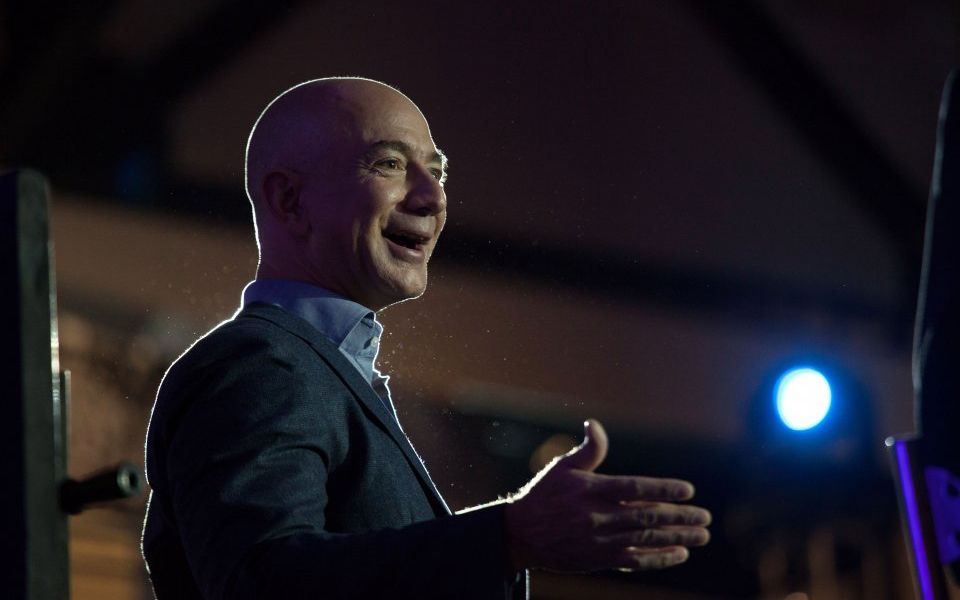Editor’s notes: Jeff Bezos should look closer to home for ideas on where to spend his fortune, new peer Bethell is a Lord to applaud, and the Economist shows how to stand up to social media bullies

Amazon has joined Apple in the ranks of $1 trillion companies based on market capitalisation.
Shortly before his company hit this massive (but meaningless) valuation, founder Jeff Bezos was pondering how to spend his vast wealth. Bezos is estimated to be sitting on a $130bn (£100bn) fortune – and earlier this summer he was asked what exactly he planned to do with it.
“The only way that I can see to deploy this much financial resource is by converting my Amazon winnings into space travel,” he said. Ah, yes – space travel. Where Branson and Musk have gone, now Bezos must head.
Rather than joining the race to send super-rich tourists into space, Bezos could look closer to home for ideas on how to put his earnings to good use. One doesn’t have to be a Marxist to note the disparity between the Bezos winnings (as he calls them) and life for an Amazon warehouse worker.
Read more: These are the UK's most and least reputable retailers
We prefer not to consider the reality of our Prime delivery benefits, but once understood it’s hard to shake from the mind. The author James Bloodworth went undercover as a worker at an Amazon distribution facility and, without hyperbole or agenda, painted a picture of utter misery.
Workers on insecure contracts with few rights, paid the minimum while working under maximum surveillance and efficiency monitoring. Bloodworth described one facility as feeling like a low-security prison, with people too afraid to go to the toilet for fear of missing efficiency targets. Miss too many and you’re out on your ear. You get the picture.
So, before aiming for the stars why doesn’t Bezos spend some time on his shopfloor and undertake to improve the quality of life for his work force? There are solid moral, financial and PR reasons for doing so. Bezos deserves his fortune – without question. But those who helped create it also deserve decent conditions.

A Lord to applaud
It’s not easy to defend the hereditary principle of the House of Lords, and reformists might have winced yesterday when the latest Lord Bethell began his maiden speech by recalling how the doorkeepers of the Palace of Westminster would give him sweets as a child.
However, if we are to have peers legislating by virtue of birth and lineage, we should hope that they’re all as thoughtful and upstanding as the newest member to sit on the red benches.
Lord Bethell, having recently sold his communications agency to City outfit Cicero, is now free to champion causes from the upper house and it’s clear from his debut yesterday that the calibre of the Lords has just nudged up a notch.
Bethell’s first speech was during a debate on the use of data in the NHS and healthcare in general – and his observations on the risks and benefits of big data were rooted in personal experience and delivered with great clarity. He says he looks forward to the “mother of all workloads in the mother of all parliaments”, and I expect his contributions will be significant.
Labour prepares for battle over shameless Seumas
It’s no secret that the Labour party isn’t a picture of harmony these days, but eyebrows were raised yesterday when Labour MP Mike Gapes used a speech in the Commons to launch a blistering attack on Corbyn’s chief aide, Seumas Milne.
Read more: ‘No place’ for illegal Russian activity in City, minister vows
Referring to Milne’s statements in the wake of the Salisbury poisoning, Gapes accused Milne of “dissembling and attempting to divert the attention from the real culprits” – before listing various occasions on which Milne had cosied up to Putin or pushed pro-Russian lines. Labour’s Cold War is heating up!
The Economist shows how to stand up to social media bullies
We’ve got used to brands cowering in the face of social media outrage – pulling their adverts from the Daily Mail or apologising for an inadvertent microaggression – but now institutions that should be bastions of free speech and intellectual inquiry are also bending the knee to Twitter mobs.
The New Yorker magazine was due to interview former Trump aide Steve Bannon at a live event. The invitation was rescinded by the New Yorker editor after a wave of outrage, powered by a number of celebrities who were due to attend the festival but threatened to withdraw if Bannon remained on the bill.
The magazine’s editor, David Remnick, could have used the opportunity to school the snowflake celebrities in the realities of life and the importance of open debate, but he didn’t. He backed down.
Fortunately, another publication also due to host a conversation with Bannon is made of stronger stuff. The Economist’s editor issued a statement after coming under similar pressure to no-platform Bannon, saying “the future of open societies will not be secured by like-minded people speaking to each other in an echo chamber”. Bravo.
